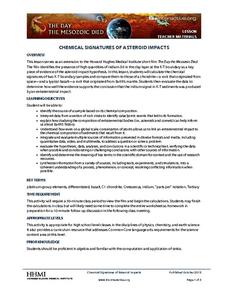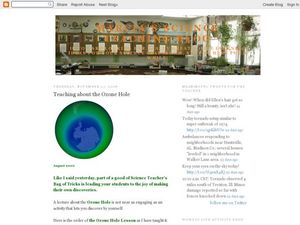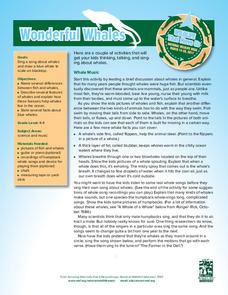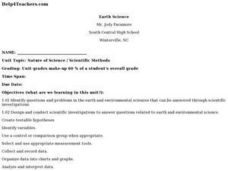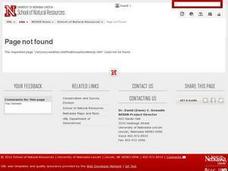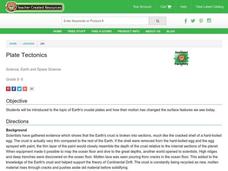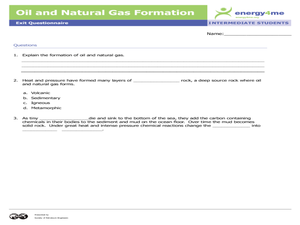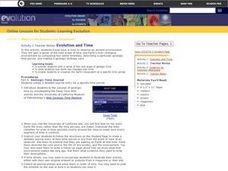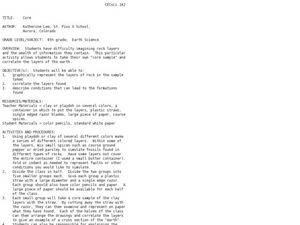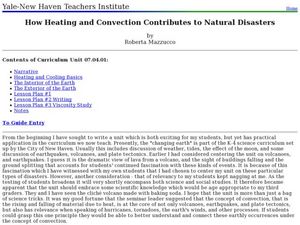NOAA
Where There's Smoke, There's ...
A remotely operated vehicle approaching a volcano was engulfed by molten sulfur where the plumes of fluids contained the highest concentrations of aluminum ever recorded. This isn't science fiction or an April fools joke, though it did...
Howard Hughes Medical Institute
Chemical Signatures of Asteroid Impacts
What killed the dinosaurs and how do scientists know? Your high schoolers can examine these fascinating questions with a geochemical lens using the engaging 33-minute video, the accompanying data interpretation, and some thoughtful...
Curated OER
Teaching About the Ozone Hole
A PowerPoint and an accompanying worksheet introduce young meteorologists to the hole in the ozone layer. Another handout provides a coloring and graphing activity which examines the changes in the ozone. There are also links to...
Curated OER
Do We Need to Wear a Rainhat? Acid Rain: Causes, Effects, and Possible Solutions
Acid rain, and how it affects the environment, is the focus of this Earth science instructional activity. During the study, learners evaluate measures to reduce acid rain, and design an investigation to demonstrate the conection between...
Curated OER
Wonderful Whales
Primary marine biologists consider the largest living animals on Earth, the whales. Introduce them to general anatomy, unique adaptations, and behaviors. Teach them to sing a song that will help them remember some of these facts....
Curated OER
The Water We Drink
Third graders relate that the quality of their drinking water is subject to the condition of the environment and water found in streams and creeks in their community. They track the travel of a wad of paper from a student's desk to a...
Curated OER
Structure of the Earth
Sixth graders define atmosphere and hydrosphere, explore through experimentation how the atmosphere was formed, and describe the layers of the Earth's atmosphere and their distances.
Curated OER
Candy Quakes
Eighth graders, using a candy bar, gum, and Twizzlers, demonstrate the effects of deformational forces on the earth's crust. They examine the processes of rock and fossil formation.
Curated OER
Earth Science/ Scientific Methods
Students identify questions and problems in the earth and environmental sciences that can be answered through scientific investigations. They design and conduct scientific investigations to answer questions related to earth and...
Curated OER
Earth's Atmosphere and Temperature
Students explore the layers of earth's atmosphere and conduct an experiment to identify carbon dioxide. They construct models using styrofoam to represent molecules in the atmosphere's layers. To discover how sunlight efffects...
Curated OER
Explosive Ideas!
Students explore the layers of the Earth and the dynamic changes that they cause on Earth's surface. Volcanoes and earthquakes become the focus of the lesson as the Oregon State quarter and its Crater Lake images are linked to the topic.
Curated OER
Layering the Air
Learners study the layer of the atmosphere. In this lesson on the atmosphere, students discuss the composition of the air around us and how the atmosphere was formed. Learners create a scale model of the layers of the atmosphere.
Curated OER
Our Ever Changing Earth
First graders discover plate tectonics. They observe the forces of erosion. They observe the forces of weathering. They state three ways the earth changes. They record observations and make conclusions about their observations.
Curated OER
Plate Tectonics
Students complete a data sheet. In this Earth composition lesson, students learn what happens when the Earth's plates push against each other. They watch a teacher demonstration and complete a data sheet.
Curated OER
Oil and Natural Gas Formation
Students complete a narrative paper and a drawing depicting how the formation of oil and natural gas taken from the Earth's crust were once plants and animals millions of years ago. In this oil and natural gas lesson plan, students read,...
Curated OER
The Rifting of Pangaea and the Gettysburg Battlefield
Eleventh graders analyze and interpret an animated model of Earth’s rifting processes. In this Earth Science lesson, 11th graders connect Earth’s rifting processes with the Earth’s surface in the Gettysburg battlefield. ...
Curated OER
Plate Tectonics: An "Eggs"periment
Students investigate plate tectonics by observing a cracked egg shell. In this Earth science lesson, students draw borders of continents on an egg shell, only to watch it crack in a glass. Students record the breakup of the...
Curated OER
Earth's History
Seventh graders study the law of superposition by creating models of fossils in layers of rock. They examine how fossils are usually found in sedimentary rock which leads to the study of geologic history in those rocks.
Curated OER
Happy Birthday, Earth!
Young scholars visualize the Earth's ecosystem at a specific time period and how Earth has changed over time. They create a detailed journal entry for a specific time period and create a birthday card to Earth.
Curated OER
Basin & Range Faulting
Young scholars identify that the crust of the earth is constantly moving and that with the exception of faults accompanied by earthquakes, this rate of movement is far too slow to notice. Then they print a copy of cross-section map A and...
Curated OER
Core
Eighth graders take their own "core sample" with clay and/or play-dough and correlate the layers of the earth.
Curated OER
Rocks and Minerals
Students are able to describe earth processes (e.g., rusting, weathering, erosion) that have affected selected physical features in students, neighborhoods. They are able to identify various earth structures (e.g., mountains, faults,...
Curated OER
Graham Cracker Plate Tectonics
In this plate tectonics worksheet, students use Graham crackers, frosting, water and a paper plate to simulate tectonic processes such as convergent, divergent and transforming plate boundaries.
Curated OER
How Heating and Convection Contributes to Natural Disasters
Learners study the basics of heating and cooling and how it pertains to the earth. In this global instructional activity students read the Magic Tree House book then create a chart of their findings.



